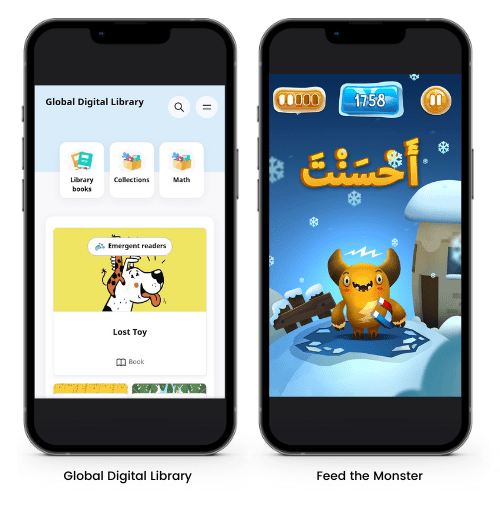A recent intervention by the World Bank that provided children with cell phones preloaded with two GDL content and the game Feed The Monster, these are solutions developed with support and funding from the Norwegian Agency for Development and All Children Reading: A Grand Challenge for Development (ACR GCD), provides compelling evidence that EdTech can improve reading outcomes for children in low resource contexts in as little as five days, with learning outcomes continuing to improve one month out.
The DIME Movies and Mobiles study engaged 9,000 Nigerian households with children between the ages of 6 to 9 with film screenings aimed at motivating parents to support their children’s education and reshape attitudes around gender bias along with a lottery, in which one-third of the participants received smartphones preloaded with access to the Global Digital Library (GDL) and Feed the Monster. During the 5-day intervention and one-month follow-up, the children who received the phones as well as their siblings, saw substantially increased literacy and numeracy test scores, leading the World Bank to recommend that EdTech interventions like this should be considered in programs and projects addressing literacy, education and child protection.
Today, the open-source online platform the Global Digital Library is home to more than 8000 books in 100 languages, all of which can be read and translated on web and mobile platforms as well as downloaded or printed.
Feed the Monster was developed in 2016 during the EduApp4Syria Prize, which was jointly funded by the Norwegian Agency for Development Cooperation (Norad), the mobile operator Orange, and the Inter-Agency Network for Education in Emergencies (INEE).

The project sought the development of smartphone apps to build foundational literacy skills and to improve psychosocial well-being for Syrian refugee children who were out of, or struggling in school. When evaluating the impact of Feed the Monster, Research has found that children using the app scored higher on oral reading fluency, which is a strong predictor of reading comprehension. Data also showed girls making gains, indicating that the app could provide girls who are denied other opportunities a chance to acquire and improve literacy skills.
In an online presentation about the intervention, the World Bank reported on the background and key findings of the low-cost, light-intervention study.
In northern Nigeria, the location of the intervention, 40% of adults lack formal education and less than 10% of parents read to their children. Only around 50% of the children attend primary school, around 35% of girls get married before turning 15, and the language used at school is rarely the one spoken in the home. Zero scores are common in third grade literacy tests. In other words, students could not read one single word in this language.
The Movies & Mobiles intervention included two components: aspirational films to reshape parents’ educational and gender attitudes, and $40 smartphones preloaded with GDL and Feed the Monster to increase the number of “study hours” available to children. Through a public lottery, one third of those who attended the films won a smartphone and picked them up in digital literacy sessions.
Researchers invited households living close to schools to the locations for community screenings of the films, which took place over weekends. Around 90% of the households that were invited attended the screenings, and 100% of those who won smartphones, picked them up.
When evaluating the data collected from the study, the World Bank reported that the aspirational films had a positive effect on parents’ attitudes on education and gender. School attendance increased by 34%. In addition, parents’ attitudes around girls shifted, with a 6% increase in parents’ aspirations to allow girls to attend school at 15, and up to a 16% increase in parents’ preference to delay daughters’ marriage age.
Notably, the children who also received the preloaded smartphones saw significantly improved learning outcomes. After using the apps for an average of around 8 hours during the first week, the children scored higher in a series of Early Grade Reading Assessment (EGRA) modules; aggregating eight modules, the World Bank reported literacy impacts of .18 standard deviations.*
There was also a spillover effect on siblings from 6 to 12 years old. The World Bank reported a 10% decrease in zero scores in letter recognition, only slightly lower than the 11.3 decrease for the child receiving the phone. Siblings also saw a .16 – .23 stand deviation increase in numeracy modules. In other words, the use of the preloaded smartphones had a statistically significant effect of improving reading both with the children receiving the phones and their siblings.
In addition, households in which children received the preloaded smartphones saw a 22% increase in parents reading to their children, and a 25% decrease in the belief that parental education is an obstacle for helping their children learn.
The World Bank researchers concluded that low cost and light interventions utilizing EdTech solutions can have a significant impact on literacy for children in low resource contexts. While longer interventions, like learning camps with volunteers, can be more effective, they also require higher cost and more effort. To address the learning crises exacerbated by the pandemic, the researchers recommended the acceleration of testing mobile-based solutions for both offline and online populations.